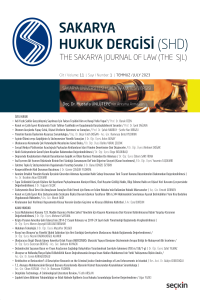Retributive or Restorative?: A Descriptive Research on the Criminal Justice Understandings of Law Enforcements in Istanbul
Abstract
The main purpose of this study is the role of punishment philosophies in the determination of punishments; from this point of view, it is to determine the understanding of criminal justice that dominates the Turkish Criminal Justice system. In this context, among the criminal justice theories, retributive justice seeing punishment as the first and primary way of dealing with injustices in the criminal justice system and believes that justice is established when the courts sentence the defendants, and restorative justice questioning the adequacy and necessity of this system and renewing the sense of justice with the alternatives it offers are focused on. Here, the parameters through which law enforcement judges, prosecutors and lawyers evaluate these two dimensions in the determination of penalties are aimed to be revealed. The data of the research, in which the qualitative research method was used, were obtained from in-depth interviews with 62 judges, prosecutors and lawyers working in criminal law in Istanbul. The data obtained were analyzed using the Maxqda Plus 2020.4 computer program. As a result, it was observed that the law enforcement officers did not focus on only one dimension of the punishment, but made different evaluations according to the crime committed, the severity of the crime, the damage it caused, and the characteristics of the accused. The most striking point here is that clear-cut distinctions cannot be seen between retributive and restorative features contrary to what is claimed in foreign researches.
References
- Akçay, Püren. “Onarıcı Adalet Modeli Çerçevesinde Uzlaştırma ve Çocuk Mahkemelerinde Uygulanması”. Pamukkale Üniversitesi Sosyal Bilimler Enstitüsü Dergisi 9 (2011), 129-144.
- Arıcan, Mehmet. Ceza Adaleti: Sistemi, Etkinliği ve İşleyişi. Ankara: Seçkin Yayıncılık, 2009.
- Ashworth, Andrew. Criminal Justice, Rights and Sentencing: A Review of Sentencing Policy and Problems. Sentencing in Australia, 35, 1986.
- Ashworth, Andrew ve V. Roberts, Julian. “Re-evaluating the Justifications for Aggravation and Mitigation at Sentencing”, Mitigation and Aggravation at Sentencing, ed. Julian V. Roberts. London: Cambridge University Press, 2011.
- Bıçak, Vahit, Onarıcı Adalet Yaklaşımıyla Ceza Adalet İsteminin Yeniden İnşası. Adalet Şurası, Ankara, 2019. Beccaria, Cesare. (2015), Suçlar ve Cezalar Hakkında. çev. Sami Selçuk. Ankara: İmge Kitabevi, 2015.
- Carroll, John S., Perkowitz, William S. Lurigio, Arthur J. ve Weaver Frances M. “Sentencing Goals, Causal Attributions, Ideology, And Personality”, Journal of Personality and Social Psychology 52/1 (1987), 107-118.
Cezalandırıcı mı yoksa Onarıcı mı?: İstanbul’da Çalışan Hukukçuların Ceza Adaleti Anlayışları Üzerine Betimsel Bir Çalışma
Abstract
Bu çalışmanın temel amacı cezaların belirlenmesi sürecinde cezalandırma felsefelerinin rolünün; bu noktadan hareketle de Türk Ceza Adaleti sistemine hakim ceza adaleti anlayışının belirlenmesidir. Bu bağlamda ceza adaleti teorileri içerisinde ceza adaleti sisteminde adaletsizliklerle baş edebilmenin ilk ve öncelikli yolunun cezalandırma olarak kabul edildiği ve mahkemeler sanıklara ceza verdiklerinde adaletin tesis edildiğine inanıldığı cezalandırıcı adalet ile mevcut cezalandırıcı adalet anlayışının hakim olduğu bu sistemin yeterliliği ve gerekliliğini sorgulayan ve sunduğu alternatiflerle adalet duygusunu yeniden inşa etmeye çalışan onarıcı adalete odaklanılmıştır. Burada da kanun uygulayıcıları hakim, savcı ve avukatların cezaların belirlenmesi sürecinde bu iki boyutu hangi parametreler üzerinden değerlendirdikleri ortaya çıkarılmaya çalışılmıştır. Nitel araştırma yöntemi kullanılan çalışmanın verileri İstanbul’da ceza hukuku alanında görev yapan 62 hakim, savcı ve avukatla yapılan derinlemesine mülakatlardan elde edilmiştir. Elde edilen veriler Maxqda Plus 2020.4 bilgisayar programı kullanılarak analiz edilmiştir. Çalışma sonucunda kanun uygulayıcılarının cezaların yalnızca bir boyutuna odaklanmadıkları, işlenen suça, suçun ağırlığına, ortaya çıkardığı zarara, sanığın özelliklerine göre değişen değerlendirmelerde bulundukları göze çarpmıştır. Burada en dikkat çekici nokta, yabancı araştırmalarda iddia edilenin aksine, cezalandırıcı ve onarıcı özellikler arasında kesin ayrımların görülmemesidir.
Keywords
References
- Akçay, Püren. “Onarıcı Adalet Modeli Çerçevesinde Uzlaştırma ve Çocuk Mahkemelerinde Uygulanması”. Pamukkale Üniversitesi Sosyal Bilimler Enstitüsü Dergisi 9 (2011), 129-144.
- Arıcan, Mehmet. Ceza Adaleti: Sistemi, Etkinliği ve İşleyişi. Ankara: Seçkin Yayıncılık, 2009.
- Ashworth, Andrew. Criminal Justice, Rights and Sentencing: A Review of Sentencing Policy and Problems. Sentencing in Australia, 35, 1986.
- Ashworth, Andrew ve V. Roberts, Julian. “Re-evaluating the Justifications for Aggravation and Mitigation at Sentencing”, Mitigation and Aggravation at Sentencing, ed. Julian V. Roberts. London: Cambridge University Press, 2011.
- Bıçak, Vahit, Onarıcı Adalet Yaklaşımıyla Ceza Adalet İsteminin Yeniden İnşası. Adalet Şurası, Ankara, 2019. Beccaria, Cesare. (2015), Suçlar ve Cezalar Hakkında. çev. Sami Selçuk. Ankara: İmge Kitabevi, 2015.
- Carroll, John S., Perkowitz, William S. Lurigio, Arthur J. ve Weaver Frances M. “Sentencing Goals, Causal Attributions, Ideology, And Personality”, Journal of Personality and Social Psychology 52/1 (1987), 107-118.
Details
| Primary Language | English |
|---|---|
| Subjects | Law in Context |
| Journal Section | Research Articles |
| Authors | |
| Early Pub Date | August 31, 2023 |
| Publication Date | August 31, 2023 |
| Submission Date | March 27, 2023 |
| Published in Issue | Year 2023 Volume: 11 Issue: 1 |

The published articles in SLJ are licensed under a
Creative Commons Attribution-NonCommercial 4.0 International License


